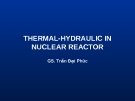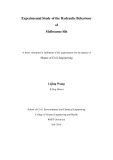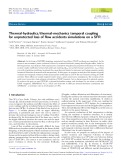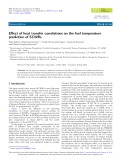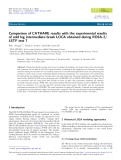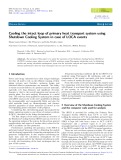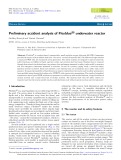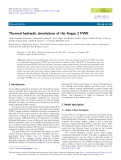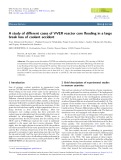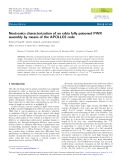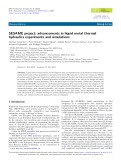
Thermal hydraulic
-
I. Introduction An important aspect of nuclear reactor core analysis involves the determination of the optimal coolant flow distribution and pressure drop across the reactor core. On the one hand, higher coolant flow rates will lead to better heat transfer coefficients and higher Critical Heat Flux (CHF) limits. On the other hand, higher flows rates will also in large pressure drops across the reactor core, hence larger required pumping powers and larger dynamic loads on the core components.
 259p
259p  giotletinh_hd2009
giotletinh_hd2009
 20-04-2013
20-04-2013
 92
92
 19
19
 Download
Download
-
The proposed research aims to investigate the influences of temperature on the water retention behaviour of deformable unsaturated soil. Volume change caused by temperature variation will be taken into consideration. This research will produce a better understanding and interpretation of thermal effects on SWCCs by providing experimental results for deformable unsaturated soils.
 118p
118p  runthenight07
runthenight07
 01-03-2023
01-03-2023
 6
6
 3
3
 Download
Download
-
In this paper, we propose an analysis of the impact of spatial variation and temporal evolution of thermal properties of fuel pins on a CFV-like core behavior during an ULOF accident. These effects are usually neglected under some a priori conservative assumptions.
 8p
8p  christabelhuynh
christabelhuynh
 30-05-2020
30-05-2020
 13
13
 1
1
 Download
Download
-
In this paper, we present a numerical analysis of the effect of different heat transfer correlations on the prediction of the cladding wall temperature in a supercritical water reactor at nominal operating conditions. The neutronics process with temperature feedback effects, the heat transfer in the fuel rod, and the thermal-hydraulics in the core were simulated with a three-pass core design.
 11p
11p  christabelhuynh
christabelhuynh
 30-05-2020
30-05-2020
 23
23
 1
1
 Download
Download
-
The paper presents the modeling of the Test Facility ROSA-2/LSTF in the calculation code CATHARE 2.V2.5. OECD/NEA ROSA-2 Project Test 7 was conducted with the Large Scale Test Facility on June 14, 2012. The experiment simulated the thermal-hydraulic responses during a PWR 13% cold leg Intermediate Break Loss Of Coolant Accident (IBLOCA).
 8p
8p  christabelhuynh
christabelhuynh
 30-05-2020
30-05-2020
 18
18
 0
0
 Download
Download
-
The purpose of this paper is to model the operation of the Shutdown Cooling System (SDCS) for CANDU 6 nuclear power plants in case of LOCA accidents, using Flowmaster calculation code, by delimiting models and setting calculation assumptions, input data for hydraulic analysis and input data for calculating thermal performance check for heat exchangers that are part of this system.
 7p
7p  christabelhuynh
christabelhuynh
 31-05-2020
31-05-2020
 20
20
 1
1
 Download
Download
-
The results of simulated transients for three typical PWR accidents are presented: a turbine trip with station blackout, a large break loss of coolant accident and a small break loss of coolant accident. The analyses show that the safety criteria are respected and that the reactor quickly reaches a safe shutdown state without operator action and external power.
 10p
10p  christabelhuynh
christabelhuynh
 31-05-2020
31-05-2020
 37
37
 1
1
 Download
Download
-
In the present work, the thermal hydraulic RELAP5-3D code was used to develop a model of this reactor. The model was performed using geometrical and material data from the Angra 2 final safety analysis report (FSAR).
 8p
8p  christabelhuynh
christabelhuynh
 31-05-2020
31-05-2020
 22
22
 1
1
 Download
Download
-
The paper covers the results of VVER core reflooding studies in fuel assembly (FA) mockup of 126 fuel rod simulators with axial power peaking. The experiments were performed for two types of flooding. The first type is top flooding of the empty (steamed) FA mockup.
 11p
11p  christabelhuynh
christabelhuynh
 30-05-2020
30-05-2020
 36
36
 1
1
 Download
Download
-
For this purpose, a simplified thermal-hydraulic analysis was performed in order to evaluate the effects on fuel thermal conductivity of adding erbia to uranium oxide. The results obtained allow to conclude that an Er-doped assembly enriched to >5 wt.% in 235U represents an advantageous solution for very long fuel cycles, and it is so suited for very high burnups.
 12p
12p  christabelhuynh
christabelhuynh
 30-05-2020
30-05-2020
 12
12
 2
2
 Download
Download
-
This paper will present the progress in the project with respect to liquid metal cooled reactor thermal-hydraulics (liquid metal heat transfer, fuel assembly thermal-hydraulics, pool thermal-hydraulics, and system thermal-hydraulics).
 8p
8p  christabelhuynh
christabelhuynh
 29-05-2020
29-05-2020
 11
11
 2
2
 Download
Download
-
The goal of this study is to demonstrate and quantify the impact that the uncertainty in thermophysical properties has on key metrics of thermal hydraulic importance for MSRs, in particular on the heat transfer coefficient. In order to achieve this, computational fluid dynamics (CFD) simulations using the RANS k-ω SST model were compared to published experiment data on molten salt.
 13p
13p  christabelhuynh
christabelhuynh
 29-05-2020
29-05-2020
 19
19
 1
1
 Download
Download








